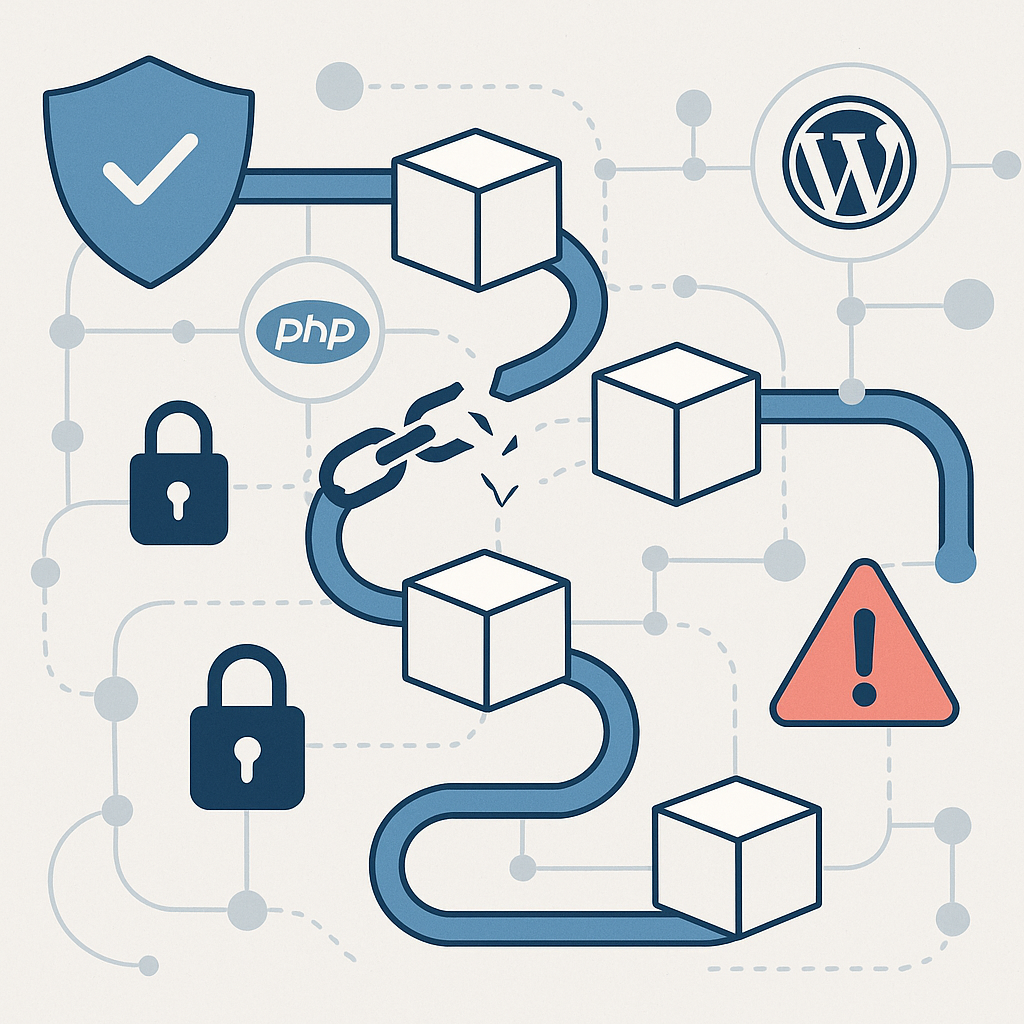CORS and CSP in the Age of AI: Why These Security Policies Are More Critical Than Ever

CORS and CSP in the Age of AI: Why These Security Policies Are More Critical Than Ever
The digital landscape has fundamentally shifted with the rise of artificial intelligence. What once required sophisticated technical knowledge and significant resources can now be accomplished by anyone with access to AI tools. This democratization of capability extends to cybersecurity threats, making robust web security policies like CORS (Cross-Origin Resource Sharing) and CSP (Content Security Policy) more critical than ever before.
As Fruition’s Service Desk Lead, I’ve witnessed firsthand how AI has transformed both the opportunities and threats in web development. Let’s explore why these security policies have become essential defenses in our AI-driven world.
The AI Threat Landscape: A New Reality
AI-Powered Attack Sophistication
Traditional web attacks required manual effort and technical expertise. Today, AI tools can:
- Generate sophisticated phishing content that bypasses traditional detection
- Automate vulnerability discovery across thousands of websites simultaneously
- Create personalized social engineering attacks using scraped data
- Develop polymorphic malware that adapts to security measures
- Craft convincing deepfake content for manipulation campaigns
The Scale Problem
AI doesn’t just make attacks more sophisticated—it makes them scalable. A single threat actor can now:
- Launch coordinated attacks across multiple domains
- Generate thousands of unique attack vectors
- Adapt strategies in real-time based on success rates
- Target specific organizations with unprecedented precision
Understanding CORS: Your First Line of Defense
What is CORS?
Cross-Origin Resource Sharing (CORS) is a security mechanism that controls which domains can access resources on your website. It prevents malicious websites from making unauthorized requests to your server using a visitor’s credentials.
Why CORS Matters More in the AI Era
AI-Enhanced Data Harvesting: AI tools can now automatically discover and exploit poorly configured CORS policies to extract sensitive data across multiple domains simultaneously.
Automated Cross-Site Attacks: Machine learning algorithms can identify patterns in CORS configurations and automatically craft attacks that exploit specific weaknesses.
LLM Integration Vulnerabilities: As businesses integrate AI chatbots and language models, improper CORS configuration can expose these AI endpoints to malicious exploitation.
Real-World AI Threat Scenario
Consider this scenario: An AI-powered attack tool scans your website and discovers that your CORS policy allows requests from *.example.com. The attacker then:
- Registers
malicious.example.com - Uses AI to generate convincing phishing content
- Tricks users into visiting the malicious subdomain
- Exploits the overly permissive CORS policy to access your API endpoints
Content Security Policy: Defending Against AI-Generated Attacks
What is CSP?
Content Security Policy is a security standard that helps prevent cross-site scripting (XSS), data injection, and other code injection attacks by controlling which resources a browser can load for your website.
CSP in the Age of AI
AI-Generated Malicious Scripts: AI can now generate sophisticated JavaScript payloads that traditional signature-based detection might miss. CSP provides a crucial layer of defense by controlling script execution.
Dynamic Attack Adaptation: AI-powered attacks can modify their approach based on CSP violations they encounter. A well-configured CSP makes this adaptation significantly more difficult.
Prompt Injection Protection: As websites integrate AI chatbots, CSP helps prevent malicious prompts from being injected through XSS vulnerabilities.
Implementation Guide: Securing Your Site
CORS Configuration Examples
Vercel Implementation (vercel.json)
{
"headers": [
{
"source": "/(.*)",
"headers": [
{
"key": "Access-Control-Allow-Origin",
"value": "https://yourdomain.com"
},
{
"key": "Access-Control-Allow-Methods",
"value": "GET, POST, PUT, DELETE, OPTIONS"
},
{
"key": "Access-Control-Allow-Headers",
"value": "Content-Type, Authorization"
},
{
"key": "Access-Control-Allow-Credentials",
"value": "true"
}
]
}
]
}Express.js Server Configuration
const express = require('express');
const cors = require('cors');
const app = express();
// Restrictive CORS configuration
const corsOptions = {
origin: [
'https://yourdomain.com',
'https://app.yourdomain.com'
],
credentials: true,
optionsSuccessStatus: 200,
methods: ['GET', 'POST', 'PUT', 'DELETE'],
allowedHeaders: ['Content-Type', 'Authorization']
};
app.use(cors(corsOptions));CSP Configuration Examples
Comprehensive CSP Header
Content-Security-Policy:
default-src 'self';
script-src 'self' 'unsafe-inline' https://www.googletagmanager.com;
style-src 'self' 'unsafe-inline' https://fonts.googleapis.com;
img-src 'self' data: https: blob:;
font-src 'self' https://fonts.gstatic.com;
connect-src 'self' https://api.yourdomain.com;
frame-src 'self' https://www.youtube.com;
object-src 'none';
base-uri 'self';
form-action 'self';
upgrade-insecure-requests;AI-Specific CSP Considerations
Content-Security-Policy:
default-src 'self';
script-src 'self' 'nonce-{random}';
connect-src 'self' https://api.openai.com https://api.anthropic.com;
worker-src 'self' blob:;
child-src 'self';
frame-ancestors 'none';Testing Your Security Policies
CORS Testing Script
// cors-test.js - Test CORS configuration
async function testCORS(targetUrl, origin) {
try {
const response = await fetch(targetUrl, {
method: 'GET',
headers: {
'Origin': origin,
'Content-Type': 'application/json'
},
credentials: 'include'
});
console.log(`Testing ${targetUrl} from origin ${origin}`);
console.log('Status:', response.status);
console.log('CORS Headers:', {
'Access-Control-Allow-Origin': response.headers.get('Access-Control-Allow-Origin'),
'Access-Control-Allow-Credentials': response.headers.get('Access-Control-Allow-Credentials')
});
return response.ok;
} catch (error) {
console.error('CORS Test Failed:', error.message);
return false;
}
}
// Test multiple origins
const testOrigins = [
'https://yourdomain.com',
'https://malicious.com',
'null'
];
testOrigins.forEach(origin => {
testCORS('https://api.yourdomain.com/data', origin);
});CSP Testing and Monitoring
// csp-monitor.js - Monitor CSP violations
document.addEventListener('securitypolicyviolation', (e) => {
const violation = {
blockedURI: e.blockedURI,
violatedDirective: e.violatedDirective,
originalPolicy: e.originalPolicy,
sourceFile: e.sourceFile,
lineNumber: e.lineNumber,
timestamp: new Date().toISOString()
};
// Send violation report to your monitoring system
fetch('/api/csp-violations', {
method: 'POST',
headers: { 'Content-Type': 'application/json' },
body: JSON.stringify(violation)
});
console.warn('CSP Violation:', violation);
});Automated Security Testing
# security-test.py - Automated CORS/CSP testing
import requests
import json
from urllib.parse import urlparse
def test_cors_policy(target_url, test_origins):
"""Test CORS policy against multiple origins"""
results = []
for origin in test_origins:
headers = {
'Origin': origin,
'Access-Control-Request-Method': 'POST',
'Access-Control-Request-Headers': 'Content-Type'
}
# Preflight request
response = requests.options(target_url, headers=headers)
result = {
'origin': origin,
'status': response.status_code,
'allowed_origin': response.headers.get('Access-Control-Allow-Origin'),
'allowed_methods': response.headers.get('Access-Control-Allow-Methods'),
'vulnerable': origin in response.headers.get('Access-Control-Allow-Origin', '')
}
results.append(result)
return results
def test_csp_policy(target_url):
"""Test CSP policy implementation"""
response = requests.get(target_url)
csp_header = response.headers.get('Content-Security-Policy')
if not csp_header:
return {'status': 'missing', 'vulnerable': True}
# Check for common vulnerabilities
vulnerabilities = []
if "'unsafe-eval'" in csp_header:
vulnerabilities.append("unsafe-eval directive found")
if "'unsafe-inline'" in csp_header and "script-src" in csp_header:
vulnerabilities.append("unsafe-inline in script-src")
if "data:" in csp_header and "script-src" in csp_header:
vulnerabilities.append("data: protocol allowed in script-src")
return {
'status': 'present',
'policy': csp_header,
'vulnerabilities': vulnerabilities,
'vulnerable': len(vulnerabilities) > 0
}
# Example usage
if __name__ == "__main__":
target = "https://yourdomain.com"
# Test CORS
malicious_origins = [
"https://evil.com",
"https://attacker.net",
"null"
]
cors_results = test_cors_policy(f"{target}/api/data", malicious_origins)
csp_results = test_csp_policy(target)
print("CORS Test Results:")
print(json.dumps(cors_results, indent=2))
print("\nCSP Test Results:")
print(json.dumps(csp_results, indent=2))The Limitations: Why CORS and CSP Aren’t Bulletproof
AI-Powered Bypass Techniques
Machine Learning Evasion: AI can analyze CSP policies and generate payloads designed to bypass specific configurations.
Social Engineering Enhancement: AI can create convincing scenarios that trick users into disabling security features or visiting malicious sites.
Zero-Day Exploitation: AI can discover and exploit browser vulnerabilities that bypass CORS and CSP protections entirely.
Real-World Limitations
- User Behavior: No security policy can protect against users who disable JavaScript or use outdated browsers
- Implementation Errors: Misconfigured policies can create false security while leaving vulnerabilities open
- Browser Support: Older browsers may not fully support modern CSP directives
- Performance Trade-offs: Overly restrictive policies can break legitimate functionality
The Human Factor
AI-powered social engineering attacks can convince users to:
- Install malicious browser extensions that bypass CSP
- Visit attacker-controlled domains that exploit CORS misconfigurations
- Disable security features through convincing technical support scams
Best Practices for the AI Era
1. Implement Defense in Depth
// Multi-layered security approach
const securityMiddleware = [
helmet(), // Basic security headers
cors(strictCorsOptions), // Restrictive CORS
rateLimit({ windowMs: 15 * 60 * 1000, max: 100 }), // Rate limiting
validateInput, // Input validation
authenticateUser, // Authentication
authorizeAccess // Authorization
];
app.use(securityMiddleware);2. Monitor and Adapt
// Real-time security monitoring
const securityMonitor = {
trackViolations: (violation) => {
// Use AI to analyze violation patterns
aiAnalyzer.analyzePattern(violation);
// Automatic policy adjustment
if (aiAnalyzer.detectAttackPattern()) {
securityPolicy.tightenRestrictions();
}
},
adaptToThreats: () => {
// Machine learning-based threat adaptation
const threatLevel = mlModel.assessCurrentThreats();
securityPolicy.adjustBasedOnThreatLevel(threatLevel);
}
};3. Regular Security Audits
#!/bin/bash
# automated-security-audit.sh
echo "Running comprehensive security audit..."
# Test CORS configuration
node cors-test.js
# Validate CSP policy
python csp-validator.py
# Check for common vulnerabilities
npm audit
# Test against AI-generated attack vectors
python ai-attack-simulator.py
# Generate security report
python generate-security-report.pyThe Future of Web Security
AI-Driven Security Evolution
As AI continues to evolve, so must our security strategies:
Adaptive Security Policies: Future implementations will use AI to automatically adjust CORS and CSP policies based on real-time threat analysis.
Behavioral Analysis: AI will monitor user behavior patterns to detect anomalies that might indicate compromise.
Predictive Threat Modeling: Machine learning will help predict and prepare for new attack vectors before they’re widely exploited.
Preparing for Tomorrow’s Threats
- Stay Informed: Follow security research and AI development trends
- Implement Monitoring: Use tools that can detect AI-powered attacks
- Regular Updates: Keep security policies current with emerging threats
- Team Training: Ensure your team understands both AI capabilities and limitations
Conclusion: Security in the Age of AI
CORS and CSP remain fundamental security policies, but they’re no longer sufficient on their own. In an era where AI can generate sophisticated attacks at scale, these policies must be part of a comprehensive, adaptive security strategy.
The key is understanding that security is not a destination but a journey. As AI continues to evolve the threat landscape, our defenses must evolve as well. By implementing robust CORS and CSP policies, monitoring for violations, and staying informed about emerging threats, we can build resilient web applications that stand up to both current and future challenges.
Remember: the goal isn’t to create an impenetrable fortress—it’s to make your site a harder target than the alternatives. In the age of AI, that means combining traditional security policies with modern monitoring, adaptive responses, and a deep understanding of how artificial intelligence is reshaping the cybersecurity landscape.
At Fruition, we help businesses navigate these complex security challenges. If you need assistance implementing robust CORS and CSP policies or want to discuss your site’s security posture in the age of AI, our Service Desk team is here to help.
Tony Diaz is Fruition’s Service Desk Lead, specializing in web security and customer service excellence. With extensive experience in web administration and a passion for helping businesses stay secure, Tony applies his customer service background to grow Fruition’s Service Desk operations.




